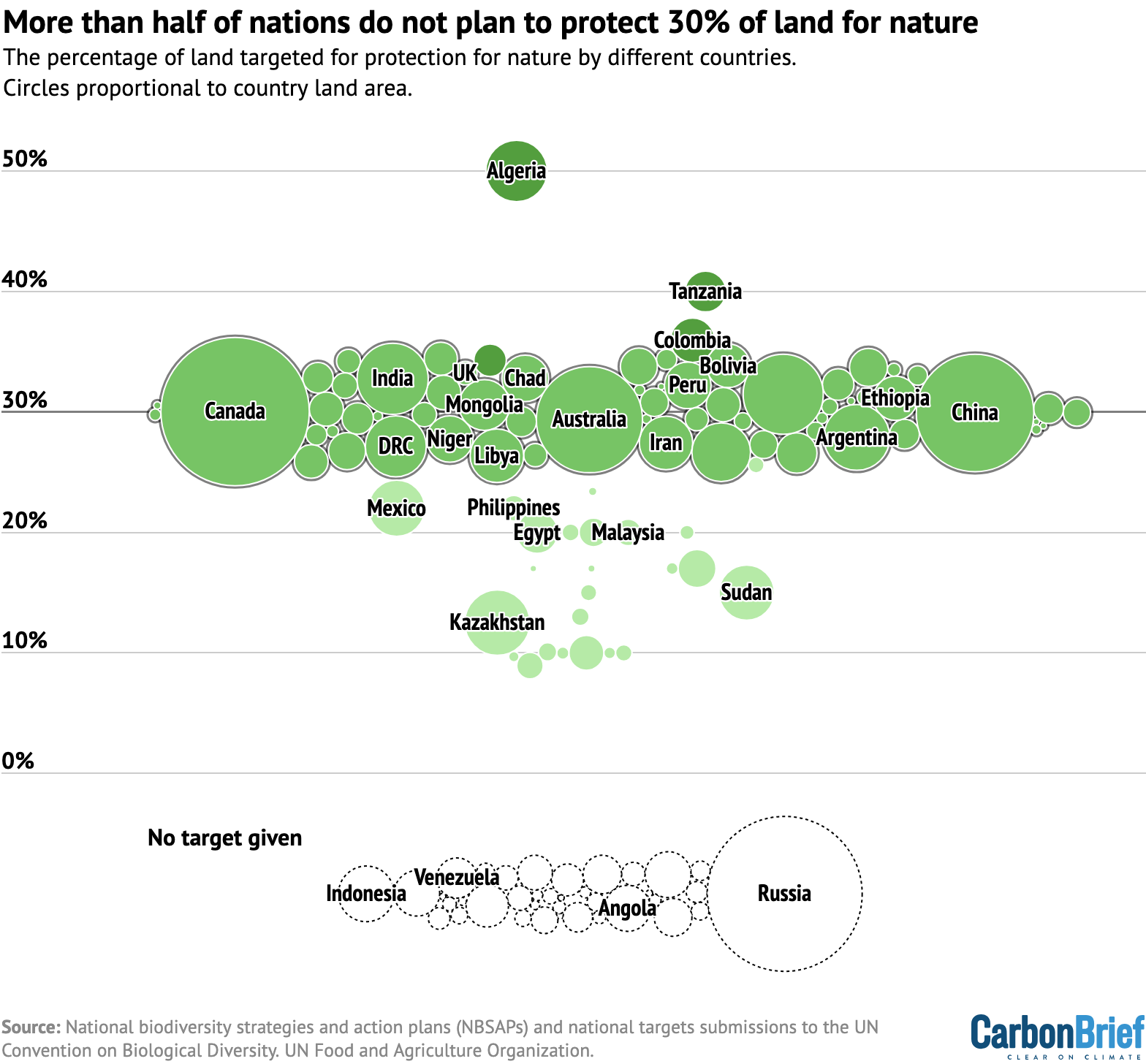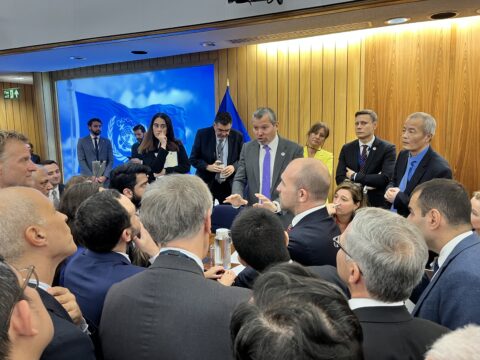Welcome to Carbon Brief’s DeBriefed.
An essential guide to the week’s key developments relating to climate change.
This week
UK considers cuts
EMISSIONS ADVICE: New recommendations from the UK’s climate advisers, the Climate Change Committee, said the nation should reduce its emissions to 87% below 1990 levels by 2040. This would keep the country on track for reaching net-zero by 2050 and take £1,400 off household bills by the same year, according to the advice. Read Carbon Brief’s in-depth summary of the findings, which show that the estimated cost of reaching net-zero is now 73% lower than thought just five years earlier.
‘Y BOTHER’: Despite not being a major focus of the new analysis, much of the UK media coverage zoned in on how achieving the emissions cut might affect people’s lives. The Guardian reported that the average person might need to skip “two kebabs’ worth of meat a week”, while a frontpage Daily Telegraph story raged at the idea that frequent fliers may need to pay a higher rate of tax, which was not a recommendation. It comes shortly after a satirical Private Eye piece by correspondent Y Bother reported that “getting net-zero done might be a massive faff”, asking: “Shall we just not do it?”
UK AID CUT: Elsewhere, prime minister Keir Starmer announced plans to cut the UK aid budget from 0.5% to 0.3% of national income and spend more on defence, the Guardian reported, just as officials entered international finance negotiations in Rome (more on this below). The newspaper said it understood the UK’s £11.6bn climate finance would be “ringfenced” from cuts, but Climate Home News reported that climate groups were “dismayed” by the move.
Around the world
- BIG VOTE: The centre-right Christian Democrats party won Germany’s federal election, with far-right Alternative for Germany in second place, Al Jazeera reported. Clean Energy Wire said the future government would still be committed to climate neutrality by 2045 but is likely to have a “reduced focus on climate policies”.
- REGULATORY REVERSAL: The US Environmental Protection Agency is aiming to reverse the “endangerment finding”, a key legal ruling that required the agency to regulate CO2 and other greenhouse gas emissions, according to the Washington Post.
- SETBACK: Energy company BP announced it will slash investment in renewables, while boosting oil and gas spending by 20%, the Associated Press reported.
- UKRAINE-US PACT: Ukraine made an agreement with the US to jointly explore its mineral resources – including oil and gas, according to a frontpage story in the Financial Times.
45%
The proportion by which Tesla’s electric vehicle sales have fallen in Europe since Elon Musk’s “political meddling”, reported Bloomberg.
Latest climate research
- A new Nature study suggested that the Atlantic Meridional Overturning Circulation (AMOC) – a system of ocean currents that moves water, heat and nutrients around the Atlantic Ocean and the globe – is unlikely to collapse this century. The research has promoted discussion around what AMOC “collapse” means.
- Climate change could lead to the creation of new carbon sinks in some ice-free areas of Antarctica, according to a study in Communications Earth and Environment.
- Peatland fires in the UK released 800,000 tonnes of carbon from 2000-21, a study in Environmental Research Letters found, accounting for 90% of the country’s total fire emissions.
(For more, see Carbon Brief’s in-depth daily summaries of the top climate news stories on Monday, Tuesday, Wednesday, Thursday and Friday.)
Captured

In December 2022, nearly all countries agreed to a flagship global target to protect 30% of Earth by the end of the decade. But a new investigation of hundreds of country plans submitted to the UN by Carbon Brief and the Guardian found that more than half of nations are not willing to commit to protecting 30% of their own land and seas. It comes as nations met in Rome this week to try to find agreement on outstanding biodiversity issues (more on this below). The chart above shows the various pledges made by countries when it comes to protecting a proportion of their land for nature, illustrating how less than half have committed to the key 30% figure.
Spotlight
COP16 talks reach finance deal
This week, Carbon Brief reports from COP16 nature talks in Rome, where countries landed a landmark finance deal in the early hours of Friday morning.
Last year saw a run of fraught and fractious environmental talks play out around the world.
Talks on reversing biodiversity loss, plastic pollution and desertification all ended in failure, while a UN climate summit in Azerbaijan produced a finance deal that was bitterly disappointing for many developing countries.
However, in the early hours of Friday morning at the Food and Agricultural Organization (FAO) headquarters in Rome, countries delivered what they described as a signal of hope for multilateralism in uncertain times.
Against a backdrop of foreign aid freezes and cutbacks in the US and Europe, nations agreed to a “permanent arrangement” to pay to help developing countries conserve biodiversity and a strategy to “mobilise” at least $200bn per year by 2030.
Striking a deal
The decision came after finance dominated discussions during the three-day resumed session of COP16 in Rome. Countries agreed to meet again in the Italian capital after failing to reach consensus at COP16 in Colombia in October 2024.
Different versions of the financing texts were negotiated throughout the week. Most countries agreed on the need to find a solution, but key disagreements still fractured the path to a deal until the summit’s final plenary.
In the end, two proposals – one from the COP16 presidency and another from Brazil on behalf of the BRICs – were merged to enable countries to find consensus on finance.
A UK official told Carbon Brief that Brazil’s leading role in the negotiations is a “very positive sign” of its commitment to working with countries ahead of hosting the COP30 climate summit in November.
Biodiversity in the balance
Colombian politician and COP16 president Susana Muhamad received a lengthy standing ovation for her role in guiding parties to consensus in the early hours of Friday morning in Rome.
But, amid celebrations, some speakers noted that nations are still far off track for meeting the targets of the Kunming-Montreal Global Biodiversity Framework (GBF). The GBF is a landmark deal, first made in 2022, aiming to halt and reverse biodiversity loss by 2030.
Some three-quarters of nations have still not submitted their UN biodiversity plans for how they will achieve the targets of the GBF – four months after the deadline.
And a recent investigation by Carbon Brief and the Guardian revealed that more than half of nations that have submitted UN biodiversity plans do not commit to the GBF’s flagship target of protecting 30% of land and seas for nature by 2030.
Carbon Brief’s in-depth summary of all of the key outcomes from the COP16 talks in Rome has just been published.
Watch, read, listen
CLIMATE DATA: A short video report by ABC News explained how the US National Oceanic and Atmospheric Administration uses automated techniques to record climate data.
‘FIRE AND FURY’: An editorial in Nature urged the global science community to resist Donald Trump’s “assault on science and international institutions”.
UNLOCK LOVELOCK: A BBC Sounds podcast told the life of James Lovelock, the co-author of the Gaia scientific theory and a former advisor to Shell who in 1966 warned the company about the risks of fossil fuels.
Coming up
- 3-4 March: First G20 agriculture working group meeting | South Africa
- 3-14 March: International Seabed Authority 30th session, legal and technical commission meeting | Kingston, Jamaica
- 4-6 March: Regional workshop on Biodiversity Beyond National Jurisdiction (BBNJ) | Mombasa, Kenya
Pick of the jobs
- Associated Press, climate social video producer | Salary: $52,046-$82,934. Location: New York
- Imperial College London, deputy director of Undaunted | Salary: £68,005-£77,703. Location: London (hybrid)
- Asian Infrastructure Investment Bank, senior economist, climate policy | Salary: Unknown. Location: Beijing
DeBriefed is edited by Daisy Dunne. Please send any tips or feedback to debriefed@carbonbrief.org.
This is an online version of Carbon Brief’s weekly DeBriefed email newsletter. Subscribe for free here.
The post DeBriefed 28 February 2025: COP16 lands finance deal; More than half of nations skip key nature pledge; UK eyes cost-saving emissions plan appeared first on Carbon Brief.
Climate Change
Pacific nations want higher emissions charges if shipping talks reopen
Seven Pacific island nations say they will demand heftier levies on global shipping emissions if opponents of a green deal for the industry succeed in reopening negotiations on the stalled accord.
The United States and Saudi Arabia persuaded countries not to grant final approval to the International Maritime Organization’s Net-Zero Framework (NZF) in October and they are now leading a drive for changes to the deal.
In a joint submission seen by Climate Home News, the seven climate-vulnerable Pacific countries said the framework was already a “fragile compromise”, and vowed to push for a universal levy on all ship emissions, as well as higher fees . The deal currently stipulates that fees will be charged when a vessel’s emissions exceed a certain level.
“For many countries, the NZF represents the absolute limit of what they can accept,” said the unpublished submission by Fiji, Kiribati, Vanuatu, Nauru, Palau, Tuvalu and the Solomon Islands.
The countries said a universal levy and higher charges on shipping would raise more funds to enable a “just and equitable transition leaving no country behind”. They added, however, that “despite its many shortcomings”, the framework should be adopted later this year.
US allies want exemption for ‘transition fuels’
The previous attempt to adopt the framework failed after governments narrowly voted to postpone it by a year. Ahead of the vote, the US threatened governments and their officials with sanctions, tariffs and visa restrictions – and President Donald Trump called the framework a “Green New Scam Tax on Shipping”.
Since then, Liberia – an African nation with a major low-tax shipping registry headquartered in the US state of Virginia – has proposed a new measure under which, rather than staying fixed under the NZF, ships’ emissions intensity targets change depending on “demonstrated uptake” of both “low-carbon and zero-carbon fuels”.
The proposal places stringent conditions on what fuels are taken into consideration when setting these targets, stressing that the low- and zero-carbon fuels should be “scalable”, not cost more than 15% more than standard marine fuels and should be available at “sufficient ports worldwide”.
This proposal would not “penalise transitional fuels” like natural gas and biofuels, they said. In the last decade, the US has built a host of large liquefied natural gas (LNG) export terminals, which the Trump administration is lobbying other countries to purchase from.
The draft motion, seen by Climate Home News, was co-sponsored by US ally Argentina and also by Panama, a shipping hub whose canal the US has threatened to annex. Both countries voted with the US to postpone the last vote on adopting the framework.
The IMO’s Panamanian head Arsenio Dominguez told reporters in January that changes to the framework were now possible.
“It is clear from what happened last year that we need to look into the concerns that have been expressed [and] … make sure that they are somehow addressed within the framework,” he said.
Patchwork of levies
While the European Union pushed firmly for the framework’s adoption, two of its shipping-reliant member states – Greece and Cyprus – abstained in October’s vote.
After a meeting between the Greek shipping minister and Saudi Arabia’s energy minister in January, Greece said a “common position” united Greece, Saudi Arabia and the US on the framework.
If the NZF or a similar instrument is not adopted, the IMO has warned that there will be a patchwork of differing regional levies on pollution – like the EU’s emissions trading system for ships visiting its ports – which will be complicated and expensive to comply with.
This would mean that only countries with their own levies and with lots of ships visiting their ports would raise funds, making it harder for other nations to fund green investments in their ports, seafarers and shipping companies. In contrast, under the NZF, revenues would be disbursed by the IMO to all nations based on set criteria.
Anais Rios, shipping policy officer from green campaign group Seas At Risk, told Climate Home News the proposal by the Pacific nations for a levy on all shipping emissions – not just those above a certain threshold – was “the most credible way to meet the IMO’s climate goals”.
“With geopolitics reframing climate policy, asking the IMO to reopen the discussion on the universal levy is the only way to decarbonise shipping whilst bringing revenue to manage impacts fairly,” Rios said.
“It is […] far stronger than the Net-Zero Framework that is currently on offer.”
The post Pacific nations want higher emissions charges if shipping talks reopen appeared first on Climate Home News.
Pacific nations want higher emissions charges if shipping talks reopen
Climate Change
Doubts over European SAF rules threaten cleaner aviation hopes, investors warn
Doubts over whether governments will maintain ambitious targets on boosting the use of sustainable aviation fuel (SAF) are a threat to the industry’s growth and play into the hands of fossil fuel companies, investors warned this week.
Several executives from airlines and oil firms have forecast recently that SAF requirements in the European Union, United Kingdom and elsewhere will be eased or scrapped altogether, potentially upending the aviation industry’s main policy to shrink air travel’s growing carbon footprint.
Such speculation poses a “fundamental threat” to the SAF industry, which mainly produces an alternative to traditional kerosene jet fuel using organic feedstocks such as used cooking oil (UCO), Thomas Engelmann, head of energy transition at German investment manager KGAL, told the Sustainable Aviation Fuel Investor conference in London.
He said fossil fuel firms would be the only winners from questions about compulsory SAF blending requirements.
The EU and the UK introduced the world’s first SAF mandates in January 2025, requiring fuel suppliers to blend at least 2% SAF with fossil fuel kerosene. The blending requirement will gradually increase to reach 32% in the EU and 22% in the UK by 2040.
Another case of diluted green rules?
Speaking at the World Economic Forum in Davos in January, CEO of French oil and gas company TotalEnergies Patrick Pouyanné said he would bet “that what happened to the car regulation will happen to the SAF regulation in Europe”.
The EU watered down green rules for car-makers in March 2025 after lobbying from car companies, Germany and Italy.
“You will see. Today all the airline companies are fighting [against the EU’s 2030 SAF target of 6%],” Pouyanne said, even though it’s “easy to reach to be honest”.
While most European airline lobbies publicly support the mandates, Ryanair Group CEO Michael O’Leary said last year that the SAF is “nonsense” and is “gradually dying a death, which is what it deserves to do”.
EU and UK stand by SAF targets
But the EU and the British government have disputed that. EU transport commissioner Apostolos Tzitzikostas said in November that the EU’s targets are “stable”, warning that “investment decisions and construction must start by 2027, or we will miss the 2030 targets”.
UK aviation minister Keir Mather told this week’s investor event that meeting the country’s SAF blending requirement of 10% by 2030 was “ambitious but, with the right investment, the right innovation and the right outlook, it is absolutely within our reach”.
“We need to go further and we need to go faster,” Mather said.

SAF investors and developers said such certainty on SAF mandates from policymakers was key to drawing the necessary investment to ramp up production of the greener fuel, which needs to scale up in order to bring down high production costs. Currently, SAF is between two and seven times more expensive than traditional jet fuel.
Urbano Perez, global clean molecules lead at Spanish bank Santander, said banks will not invest if there is a perceived regulatory risk.
David Scott, chair of Australian SAF producer Jet Zero Australia, said developing SAF was already challenging due to the risks of “pretty new” technology requiring high capital expenditure.
“That’s a scary model with a volatile political environment, so mandate questioning creates this problem on steroids”, Scott said.
Others played down the risk. Glenn Morgan, partner at investment and advisory firm SkiesFifty, said “policy is always a risk”, adding that traditional oil-based jet fuel could also lose subsidies.


Asian countries join SAF mandate adopters
In Asia, Singapore, South Korea, Thailand and Japan have recently adopted SAF mandates, and Matti Lievonen, CEO of Asia-based SAF producer EcoCeres, predicted that China, Indonesia and Hong Kong would follow suit.
David Fisken, investment director at the Australian Trade and Investment Commission, said the Australian government, which does not have a mandate, was watching to see how the EU and UK’s requirements played out.
The US does not have a SAF mandate and under President Donald Trump the government has slashed tax credits available for SAF producers from $1.75 a gallon to $1.
Is the world’s big idea for greener air travel a flight of fancy?
SAF and energy security
SAF’s potential role in boosting energy security was a major theme of this week’s discussions as geopolitical tensions push the issue to the fore.
Marcella Franchi, chief commercial officer for SAF at France’s Haffner Energy, said the Canadian government, which has “very unsettling neighbours at the moment”, was looking to produce SAF to protect its energy security, especially as it has ample supplies of biomass to use as potential feedstock.
Similarly, German weapons manufacturer Rheinmetall said last year it was working on plans that would enable European armed forces to produce their own synthetic, carbon-neutral fuel “locally and independently of global fossil fuel supply chain”.
Scott said Australia needs SAF to improve its fuel security, as it imports almost 99% of its liquid fuels.
He added that support for Australian SAF production is bipartisan, in part because it appeals to those more concerned about energy security than tackling climate change.
The post Doubts over European SAF rules threaten cleaner aviation hopes, investors warn appeared first on Climate Home News.
Doubts over European SAF rules threaten cleaner aviation hopes, investors warn
Climate Change
Southern Right Whales Are Having Fewer Calves; Scientists Say a Warming Ocean Is to Blame
After decades of recovery from commercial whaling, climate change is now threatening the whales’ future.
Southern right whales—once driven to near-extinction by industrial hunting in the 19th and 20th centuries—have long been regarded as a conservation success. After the International Whaling Commission banned commercial whaling in the 1980s, populations began a slow but steady rebound. New research, however, suggests climate change may be undermining that recovery.
Southern Right Whales Are Having Fewer Calves; Scientists Say a Warming Ocean Is to Blame
-
Greenhouse Gases7 months ago
Guest post: Why China is still building new coal – and when it might stop
-
Climate Change7 months ago
Guest post: Why China is still building new coal – and when it might stop
-

 Greenhouse Gases2 years ago
Greenhouse Gases2 years ago嘉宾来稿:满足中国增长的用电需求 光伏加储能“比新建煤电更实惠”
-
Climate Change2 years ago
Bill Discounting Climate Change in Florida’s Energy Policy Awaits DeSantis’ Approval
-
Climate Change2 years ago
Spanish-language misinformation on renewable energy spreads online, report shows
-

 Climate Change2 years ago
Climate Change2 years ago嘉宾来稿:满足中国增长的用电需求 光伏加储能“比新建煤电更实惠”
-
Climate Change Videos2 years ago
The toxic gas flares fuelling Nigeria’s climate change – BBC News
-

 Carbon Footprint2 years ago
Carbon Footprint2 years agoUS SEC’s Climate Disclosure Rules Spur Renewed Interest in Carbon Credits





